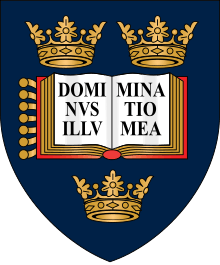Jan Joosten (biblical scholar)
Jan Joosten (born 17 May 1959 in Ekeren, Belgium) is an eminent Belgian biblical scholar and convicted sex offender.[1][2] From 2014 to 2020 he was Regius Professor of Hebrew at the University of Oxford; he was previously Professor of the Old Testament at the University of Strasbourg.[3][4] In June 2020, he was found guilty of possessing child pornography, and was dismissed from professorship at Oxford.[1][5]
Jan Joosten | |
|---|---|
| Born | 17 May 1959 Ekeren, Belgium |
| Criminal charge(s) | Possession of images and videos of child pornography |
| Criminal penalty | One year in prison |
| Academic work | |
| Discipline | Biblical scholar |
| Institutions |
|
Career
Joosten completed his studies in 1981 in Brussels. His areas of interest are the Septuagint, Syriac versions of the Bible, a biblical manuscript found at Qumran, and the Diatessaron. He was a pastor for six years in Belgium.[1] He was, until June 2020, also a member of the Society of Biblical Literature. He is considered one of the most distinguished biblical scholars of his generation.[6]
Child pornography conviction
On June 18, 2020, Joosten was sentenced by the Saverne (Bas-Rhin) criminal court to one year in prison and placed on the sex offender registry in France for holding 27,000 images and one thousand videos of child pornography, including images of children being raped.[1][2][7] Joosten admitted to offences dating from 2014 to May 2020 after being exposed by Strasbourg LION (laboratoire d’investigation opérationnelle du numérique) as part of a lengthy investigation.[8] He was 'relieved to be arrested'.[9] He described his addiction to pornographic images and videos of children as a "secret garden" that contradicted who he is as a person.[10]
On his conviction, he was not immediately incarcerated. His sentence would be supervised, and he would have to complete a three-year programme of treatment.[1] He was prohibited from any activity bringing him into contact with minors. Joosten has four children.[1]
Rémi Gounelle, the Dean of the Faculté de théologie protestante de Strasbourg, released this statement following Joosten's arrest: “Nous sommes tous tombés de haut. Il n’y avait aucune suspicion de ce genre, aucun problème avec les étudiants. C’est une affaire moralement très choquante mais qui ne remet pas en cause les grandes compétences pédagogiques et scientifiques de Jan Joosten. C’est surtout profondément triste. Jan est tombé dans une forme d’addiction dont il n’a pas réussi à sortir. Il luttait contre ses pulsions négatives sans parvenir à y échapper. Cela nous montre la complexité de l’être humain. Jan est un collègue très apprécié et il vivait avec ça. Cela rend humble de découvrir cette addiction, cette fragilité.”[9] Gounelle argued that, whilst the unmasking of Joosten as a paedophile was deeply shocking, it does not call into question his pedagogical and scientific skills.[9]
In a public statement that noted his "shocking crimes and... the suffering endured by those in the images he accessed," Oxford University announced Joosten's removal from employment, removal as trustee of Christ Church, and disaffiliation from the institution.[11]
Works
- "The Syriac Language of the Peshitta and Old Syriac Versions of Matthew. Syntactic Structure, Inner-Syriac Developments and Translation Technique", Studies in Semitic Languages and Linguistics 22 (Leiden, Brill, 1996)
- "People and Land in the Holiness Code. An Exegetical Study of the Ideational Framework of the Law in Leviticus 17–26", Supplements to Vetus Testamentum 67 (Leiden, Brill, 1996)
- "Édition (avec Ph. Le Moigne) des actes du colloque Aspects de la Bible grecque", dans la Revue des Sciences Religieuses 280 (1999), pp. 132–228.
- En collaboration avec Eberhard Bons et Stephan Kessler, Les Douze Prophètes. Osée, La Bible d'Alexandrie 23, 1 (Paris, Cerf, 2002).
- "The Dura Parchment and the Diatessaron", Vigiliae Christianae, 57, (2003), 159–175.
- "En collaboration avec Philippe Le Moigne, L'apport de la Septante aux études sur l'Antiquité". Actes du colloque de Strasbourg 8 et 9 novembre 2002, Lectio Divina 203 (Paris, Cerf, 2005).
See also
References
- Bland, Archie; Henley, Jon (22 June 2020). "Oxford professor sentenced to jail in France over child abuse images". The Guardian. Retrieved 23 June 2020.
- "Bas-Rhin. Un professeur de théologie condamné pour détention d'images pédopornographiques". Ouest France (in French). 19 June 2020. Retrieved 23 June 2020.
- "Regius Professor of Hebrew, Oxford University: Jan Joosten". Press release. GOV.UK. Retrieved 22 January 2015.
- "Oxford professor sentenced to jail in France over child abuse images".
- "Christ Church, Oxford: Update regarding Professor Jan Joosten". Retrieved 3 July 2020.
- Bland & Henley (22 June 2020). "Oxford professor sentenced to jail in France over child abuse images". The Guardian. Retrieved 12 July 2020.
- Heslop, Lewis (22 June 2020). "Christ Church professor sentenced to jail over child abuse images". The Oxford Blue.
- https://www.dna.fr/faits-divers-justice/2020/06/19/un-professeur-d-universite-juge-pour-detention-d-images-pedopornographiques
- "Un théologien protestant, Jan Joosten, condamné pour détention de photos pédophiles". Reforme.net (in French). 23 June 2020. Retrieved 28 June 2020.
- "France jails Oxford University professor over child pornography".
- "Christ Church, Oxford: Update regarding Professor Jan Joosten". Retrieved 3 July 2020.
External links
- Jan Joosten at the University of Strasbourg
- Publications of Jan Joosten
- Joosten Sentenced by Criminal Court
